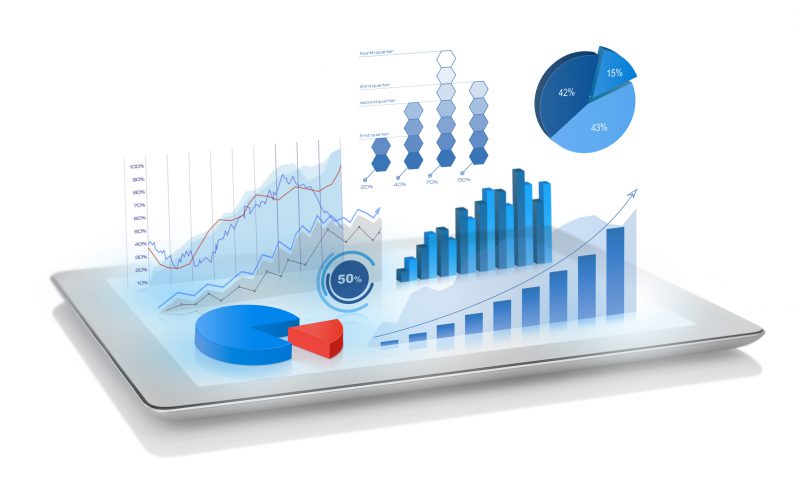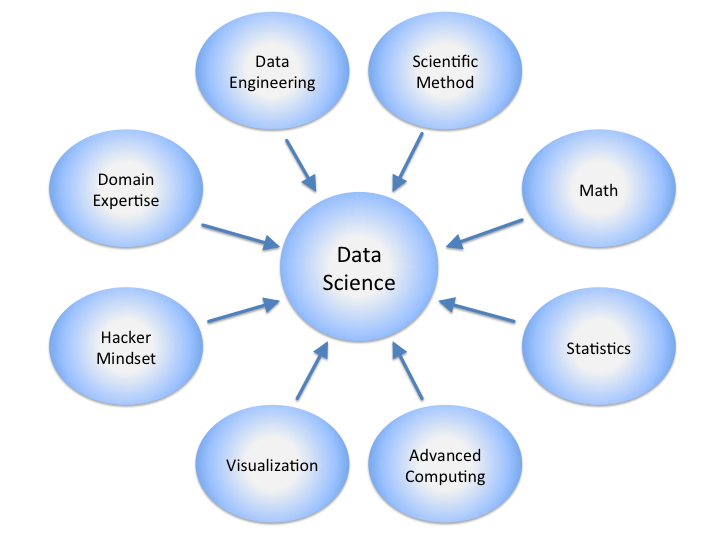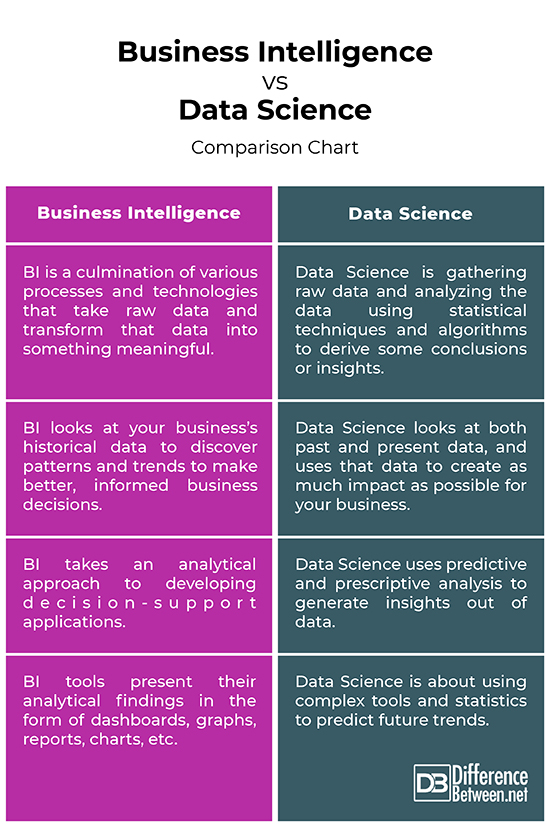Difference Between Business Intelligence and Data Science
Over the past couple of years, the business world has become increasingly focused on data because businesses are generating loads of data in all of its every-day operations and processes. Data has now become an intangible asset and businesses are now recognizing the intrinsic value of data. Businesses are using this data to gain real-time visibility into their operations through data analysis. And for data analysis, they must first identify the right kinds of information sources. Data can be viewed as a raw material from which information can be obtained and used for solving business related problems. That being said, BI and Data Science are two of the most recurring terms that are often talked about when it comes to data.

What is Business Intelligence?
Business Intelligence or BI is a technology-driven process that provides the business community easy access to business data. BI is not a product or a system. Every business generates loads and loads of data in all of its different activities and every-day operations. And businesses can use this data for operations analysis and gain real-time visibility into their operations. Data plays a fundamental role in your business model, leading to exciting new ways to generate revenue. But the data only makes sense when it’s analyzed and used to make business decisions. So, BI is all about harnessing the power of data that your business generates, and then analyzing and visualizing this data to gain valuable insights about your business and how is it performing. These insights allow you to make better, informed business decisions to help grow your business. BI is a culmination of various processes and technologies that take raw data and transform that data into something meaningful.

What is Data Science?
We have seen how data is influencing the every-day operations of businesses around the world and helping them generate revenue from this data. Data has a huge potential in it and Data Science is the means to recognize that potential and use the data to create as much impact as possible for your business. Now, this impact can be recognized in terms of many things, such as in the form of insights, in the form of data products, or in the form of product recommendations, or just anything. Data science helps you solve business-related problems with data and whatever tools you have at your disposal. The massive rise in the Big Data over the years have given rise to data science to handle the increasing needs of businesses to gain insights from the massive pool of unstructured data sets. So, Data Science is almost everything that has anything to do with data. Data Science is gathering raw data and analyzing the data using statistical techniques and algorithms to derive some conclusions or insights.
Difference between Business Intelligence and Data Science
Meaning
– While both BI and Data Science focus on data, Data Science is a bit more complex than BI. In fact, Data Science could be seen as an evolution of BI. Virtually every aspect of business is now open to data collection. Data Science is a culmination of various processes and technologies used for extracting useful information and knowledge from data. Data Science is gathering raw data and analyzing the data using statistical techniques and algorithms to derive some conclusions or insights. So, Data Science is basically everything that has something to do with data.
Focus
– BI looks at your business’s historical data to discover patterns and trends to make better, informed business decisions to help grow your business. BI is about analyzing and visualizing the data to gain valuable insights about your business and how is it performing. Data Science, on the other hand, looks at the significance behind those trends by analyzing past data to make future predictions. Data Science is the means to recognize the potential of data and use that data to create as much impact as possible for your business.
Strategy
– BI takes an analytical approach to developing decision-support applications using structured data in order to seek out competitive advantages. BI is the combination of strategies and technologies used for data analysis. Analysis plays a key role in developing a BI decision support environment. BI tools present their analytical findings in the form of dashboards, graphs, reports, charts, and so on. Data Science is about extracting meaningful insights from a vast pool of data using a variety of different technologies, algorithms, and processes.
Business Intelligence vs. Data Science: Comparison Chart

Summary of Business Intelligence vs. Data Science
Data has a huge potential in it and Data Science is the means to recognize that potential and use the data to create as much impact as possible for your business. Data Science is much more complex than BI, which merely looks at the historical data of your business to discover hidden patterns. Data Science, on the contrary, collects and analyzes both past and present data to gain some insights out of that data in order to help you solve business-related problems. Ultimately, Data Science is about extracting information or knowledge from data based on a variety of technologies, algorithms and processes.
- Difference Between Caucus and Primary - June 18, 2024
- Difference Between PPO and POS - May 30, 2024
- Difference Between RFID and NFC - May 28, 2024
Search DifferenceBetween.net :
Leave a Response
References :
[0]Moss, Larissa T. and S. Atre. Business Intelligence Roadmap: The Complete Project Lifecycle for Decision-support Applications. Massachusetts, United States: Addison-Wesley, 2003. Print
[1]Marr, Bernard. Big Data For Small Business For Dummies. New Jersey, United States: John Wiley & Sons, 2016. Print
[2]Liebowitz, Jay. Big Data and Business Analytics. Florida, United States: CRC Press, 2013. Print
[3]Shah, Chirag. A Hands-On Introduction to Data Science. Cambridge, England: Cambridge University Press, 2020. Print
[4]Provost, Foster and Tom Fawcett. Data Science for Business: What You Need to Know about Data Mining and Data-Analytic Thinking. California, United States: O'Reilly Media, 2013. Print
[5]Image credit: https://commons.wikimedia.org/wiki/File:DataScienceDisciplines.png
[6]Image credit: https://commons.wikimedia.org/wiki/File:Business-Intelligence-800x493.jpg
